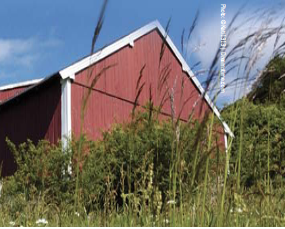“Going green” is something we’re hearing a lot these days. As we become increasingly aware of the negative impact we’re having on the planet, we’re discovering more and more ways to be environmentally friendly and reduce our ecological footprint. Here are seven ways you can do your part around your farm.
1. Take care of your pasture
Many people struggle to make environmentally friendly changes because in most cases, they don’t see any immediate results or what impact they’re really having. So let’s start with something we can see a difference in – our pastures. Proper pasture management is important both for our horses and the land. Pastures that aren’t maintained end up as weedy messes filled with manure and mud. Not only does this negatively affect the horses, but it also degrades the topsoil, hastens erosion, affects the balance of plant life, and potentially allows waste to run off into water sources. In addition, poorly maintained pastures are often overgrown with weeds, tempting people to use chemical sprays to get rid of them. This is unnecessary in a properly maintained pasture. Pasture rotation and management, as well as manure management, are key.
2. Manage your manure
There are a variety of ways to handle the manure you remove from your pastures and stalls/run-ins. Some people have it hauled away, some spread it onto their pastures or crop fields, while others let it pile up and ignore it. Then there’s the small but growing group of people who are composting their manure/waste bedding. This relatively simple process allows you to create your own rich compost, which when done properly can be excellent for spreading back on your pastures. The composting process breaks down the chemicals and parasites in your horse’s waste, so you are not putting them back on your fields. This saves you money, creates healthier pastures, and makes for happier ponies!
A “how to” on building your own composting bins and beginning the composting process is an article in itself. Check out O2compost.com or other resources online to get started.
3. Bedding down
If you look into composting your manure, you may also want to re-evaluate your stall or run-in bedding. Some types of bedding break down easily and quickly, while others are disposal nightmares.
You will also want to take a look at what’s in your horse’s bedding. If it’s made from recycled wood or paper, it’s likely to have some chemicals in it (ink, paint, etc.). Do consider this when you are looking at how to dispose of used bedding. Some pelleted beddings may also contain a “binding” agent to help keep them in their compressed form until used.
4. Try organic
It’s now fairly common for farmers to spray hay before baling to reduce moisture (mold) and pests. Obviously the sprays are not contained solely to the hay, and float over the surrounding farmland and vegetation. If you have the option, look into organic, or hay suppliers that do not use chemicals.
Be aware that chemicals are also used in the growing and processing of most equine feeds. Consider companies that use organically grown options, which are much more environmentally friendly. You may even want to start your own organic garden, full of carrots and other treats for the horses on your farm to enjoy. If you board horses, you could offer a co-op type garden, where your boarders could each have a patch of garden to grow yummy things for themselves and their horses.
5. Cleaning without chemicals
There are now a number of earth and horse friendly cleaning products on the market. Whether you are power washing barn stalls and aisles, cleaning windows or scrubbing troughs, environmentally friendly alternatives mean you don’t need to feel bad about what’s going down the drain.
6. Energy conservation
Conserving electricity is one of the first environmental lessons we were taught in school, and is a very simple thing to put into practice. Sometimes, though, it seems the simplest things are the ones most easily overlooked. Any barn owner can tell you that powering a farm is not inexpensive. Between arena lighting, barn lighting, heated tackrooms and hot wash racks, barns don’t run cheap. Simple things can make a big difference, and each boarder can do her part. For example, turn the arena lights on as you go in, not half an hour ahead of time while you tack up, and don’t leave the heated tackroom door wide open (I’m sure most boarding barn owners can relate to this one!). While each indiscretion may not seem like a big deal, just imagine if every boarder forgot to turn the arena lights off when she left – it adds up fairly quickly.
If you’re a barn owner, check into energy saving options. Efficient lighting and energy alternatives such as solar and wind power are becoming more common. Choose energy efficient appliances for your barn’s lounge/kitchen.
7. The three R’s
Reduce, re-use, recycle – who will ever forget that familiar alliteration? Being environmentally friendly can be as simple as ensuring you have a recycle bin in the barn for your boarders’ water bottles, supplement containers, and worn-out horse magazines. You’d be surprised at the number of recyclables a small boarding barn can produce, and if a recycle bin isn’t readily available, you can bet those items are going in the trash.
We have all heard the phrase “one person’s trash is another person’s treasure”. Websites such as Craigslist or your local equine community forum offer a place to advertise items you no longer have a need for. Many people are on the lookout for items that are used yet still functional, and selling them keeps them out of the landfill.
Thinking a little greener around the farm really doesn’t take much effort and can offer some wonderful benefits for you, your horses, and the environment. A little bit can go a long way!








